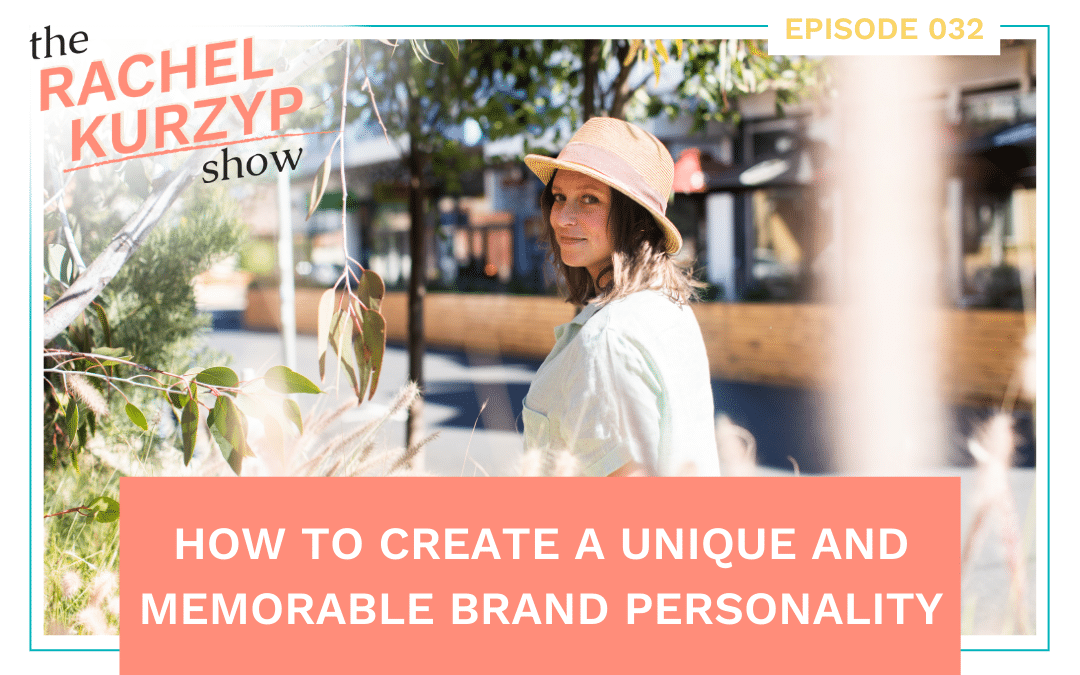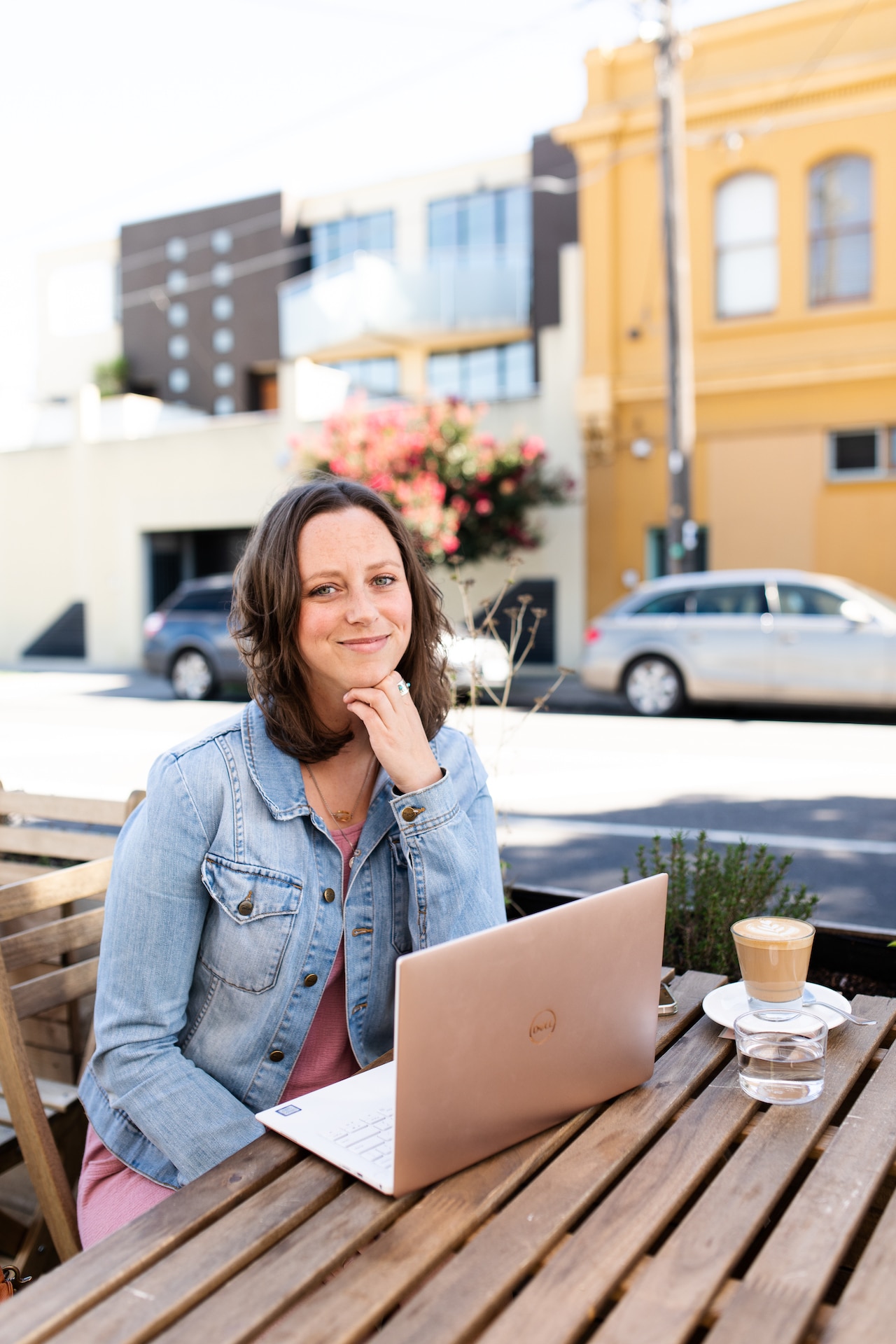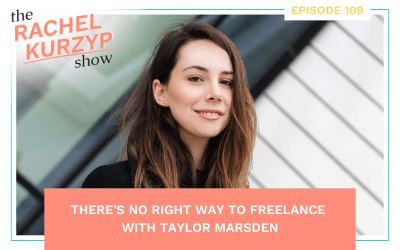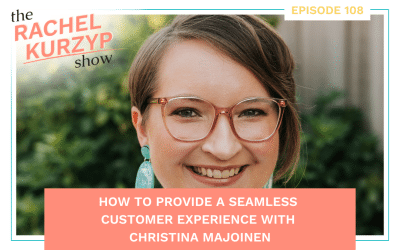Welcome to The Rachel Kurzyp Show.
What do you want your dream clients to feel, think or do after engaging with you?
Understanding how a strong brand personality is created will help you attract your dream clients, increase your visibility, position yourself as an expert, and support you to invite people to work with you.
That’s why today on the show, I want to share the 4 components that make up your brand personality.
Component #1 – Know your why
Why does your business exist?
When’s the last time you thought about that question? Whether you’re just starting out, or you’ve been in business for ten years, what is your business’ “why?” What is its purpose?
Most businesses define themselves by “what” they do e.g. I help small-businesses owners write great copy, but they should be defining themselves by why they do it. This is because most people don’t buy products or services based on what a business does. Instead, people purchase a product or service based on why that business does what they do.
That’s why you need to be clear on your why and incorporate it into everything you say, do and even how you act.
The easiest way to determine your why is to set aside time to answer questions like what impact or change am I trying to have on the world?And why should anyone care? Once you have your answers, you can use these to guide what content you create and how you invite people to work with you.
Component #2 – Understand your audience
You need to be able to identify and get into the head of your dream client. If you want to create a brand that has people DMing you saying “you’re in my head” and “you’re my kind of person” then you need to go back and listen to episode 6 and 10. I explain in detail how to attract and connect with your audience.
Component #3 – Craft your key messages
So, what do I even mean by key messages? They are the 5-7 pieces of information you want your dream clients to hear, understand and remember. Think of them as bite-sized 1-2-line summaries that share who you are, what you do, how you’re different and how you help your dream clients.
Key messages help you to prioritize and define what information is important, ensure you’re saying the same things over and over because remember people need to hear us say the same thing 20-40 times before they buy and they allow you to measure what content is working and what isn’t.
Key messages form the foundation of your branding and content marketing efforts and when they’re done right, not only do they help you attract and sell to your dream clients they will help you feel good about showing up because you’ll be able to talk about your business in a way that reflects your values, language and style.
The easiest way to determine your key messages is to set aside time to answer questions like what your business stands for and how you help your dream clients. Once you have your answers, you can use the key messages in your content on the regular.
Component #4 – Determine your voice
Your brand identity will come from the words you use, your tone and what topics you talk about. And for most of us, it’s a real struggle to transfer who we are, act and sound in real life to the internet.
Brand voice refers to the personality and emotion infused into a business’s content. It plays an important role in making sure your message cuts through the noise and makes your dream clients stop the scroll.
So What Exactly is the Difference Between Voice and Tone? I get asked this a lot.
Voice: This describes your business personality. It’s consistent and unchanging.
Tone: The emotional inflection applied to your voice. It adjusts to what’s suitable for a particular piece or message.
For example, an Insta post about a birthday sale would have a more light-hearted tone than a blog post explaining that people won’t receive their products by Xmas due to postal issues.
The easiest way to determine your voice is to complete a content audit and see what words, phrases and tone of voice come up repeatedly. Once you identify it, you can refine and use it consistently.
And a few final tips, before you go off and create your brand personality.
Remember you’re not trying to create a character or business persona because this is hard to do and maintain. And I don’t want you to go all corporate, gobbledygook speak on me – which I see happen a lot.
In most cases, how you talk about your work to your mates on a Friday night over a wine, or to a client you love working with in an email, is where your personality really stands out. It’s in these everyday, uncensored moments people get an understanding of who you are, what you do, and how you help.
So when you’re creating your brand personality, draw your inspiration from these moments NOT the anger-fueled email you sent to Karen about how to save off a PDF or Insta post you wrote about why your clients can’t pay your damn invoice on time.
Your brand personality will act as a guide when you’re creating website content, marketing material, your services, and so on. So refer to your brand personality on the daily to make sure you’re talking about yourself and your business in a clear and consistent way that feels right to you.
And if coming up with ideas of what to post is holding you back, download my free guide 7 types of content to convert followers into clients.
I’ll walk you through what content to create using my content formulas. I even provide before and after post examples so you can see how easy it is to apply my formulas in your biz.
Head to rachelkurzyp.com.au/7contenttypes to get your copy.
Thanks so much for tuning into today’s episode.
If you’ve found what I’ve shared valuable please leave a review and hit the subscribe button so you don’t miss when a new episode drops every Wednesday.





